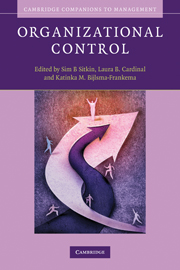Book contents
- Frontmatter
- Contents
- List of figures
- List of tables
- Contributors
- Foreword
- Part I Introduction and history
- Part II Conceptions of organizational control
- Part III Identity, attention, and motivation in organizational control
- Part IV Relational control
- Part V Managerial and strategic control
- 12 Control to cooperation: examining the role of managerial authority in portfolios of managerial actions
- 13 Consequences and antecedents of managerial and employee legitimacy interpretations of control: a natural open system approach
- 14 Managerial objectives of formal control: high motivation control mechanisms
- 15 Control configurations and strategic initiatives
- Index of terms
- Author index
- References
12 - Control to cooperation: examining the role of managerial authority in portfolios of managerial actions
Published online by Cambridge University Press: 05 June 2012
- Frontmatter
- Contents
- List of figures
- List of tables
- Contributors
- Foreword
- Part I Introduction and history
- Part II Conceptions of organizational control
- Part III Identity, attention, and motivation in organizational control
- Part IV Relational control
- Part V Managerial and strategic control
- 12 Control to cooperation: examining the role of managerial authority in portfolios of managerial actions
- 13 Consequences and antecedents of managerial and employee legitimacy interpretations of control: a natural open system approach
- 14 Managerial objectives of formal control: high motivation control mechanisms
- 15 Control configurations and strategic initiatives
- Index of terms
- Author index
- References
Summary
This chapter presents a new theoretical direction for control research. Managerial controls that comprise the primary focus of this research describe the various initiatives managers undertake to motivate, evaluate, and reward subordinates for performing work in ways consistent with the achievement of an organization's interests, goals, and strategies (Merchant,1985). From the earliest research on organizations, the act of controlling subordinates has been recognized as one of a manager's primary functions (Blau and Scott, 1962). Since that time, researchers have identified various mechanisms by which managers exercise control in their organizations including the development and implementation of formal policies (Barnard, 1938), rational-legal authority and rules (Weber, 1968[1918]), cultural norms and rituals (Van Maanen and Schein, 1979), or incentive systems, direct supervision, and/or work designs (Mintzberg, 1979).
While traditional control theory focuses primarily on how managers exercise their power through applications of managerial controls, I propose here that a more deliberate consideration of how managers develop and utilize their managerial authority may help scholars formulate more realistic pictures of managerial attention and action (Ocasio, 1997) and better comprehend how managers actually cultivate high levels of superior–subordinate cooperation.
Managerial authority refers to a person's right to exercise power based on the belief that his or her actions are legitimate and in alignment with accepted standards of appropriate conduct. I specifically argue that a manager's interest in preserving, protecting, and promoting his/her managerial authority constitutes a primary motivation for managerial action.
- Type
- Chapter
- Information
- Organizational Control , pp. 365 - 395Publisher: Cambridge University PressPrint publication year: 2010
References
- 13
- Cited by

